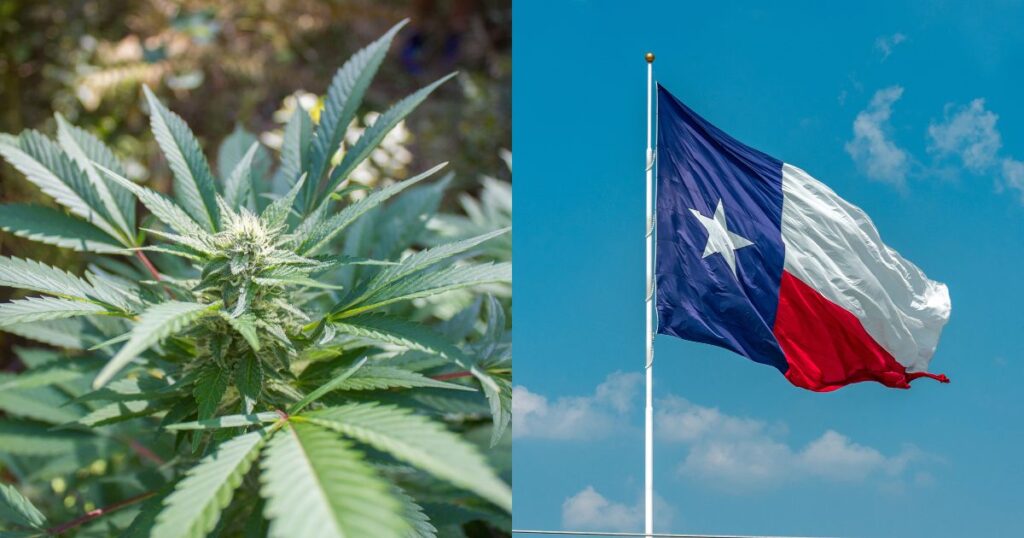The Texas legislature finds itself at a crossroads on cannabis policy. While lawmakers debate Senate Bill 5’s strict approach to regulating intoxicating hemp products during a special legislative session, a new proposal has emerged that could reshape the entire conversation around cannabis in the Lone Star State. House Bill 195, filed by Representative Jessica González on July 24th, presents a framework for adult-use cannabis legalization in Texas.
What HB 195 Would Change for Texas Cannabis Laws
The proposed legislation represents a significant departure from Texas’s current cannabis prohibition policies. Under HB 195, adults aged 21 and older would gain the legal right to possess up to 2.5 ounces of cannabis, including up to 15 grams in concentrated form.
The bill also permits adults to transfer these same amounts to other adults without payment, provided such transfers aren’t advertised or promoted publicly.
Home storage allowances would expand considerably under the proposal. Adults could legally maintain up to 10 ounces of cannabis in their private residences, though any amount exceeding 2.5 ounces must remain secured in locked containers or restricted access areas.
Notably, the legislation stops short of authorizing home cultivation, keeping cannabis production within the regulated commercial framework.
The bill establishes clear boundaries for cannabis consumption. Public use remains prohibited except in designated areas approved by local governments and restricted to adults.
Vehicle operation under the influence continues as illegal conduct, and cannabis consumption in motor vehicles, aircraft, and watercraft stays forbidden.
Property owners retain rights to prohibit cannabis smoking on their premises, though they cannot ban other consumption methods or possession of cannabis products and paraphernalia.
Commercial Adult-Use Cannabis Framework Under HB 195
The legislation creates a regulatory structure for commercial cannabis operations overseen by the Texas Department of Licensing and Regulation. This framework goes over licensing for cannabis growers, secure transporters, testing facilities, processors, and retail establishments.
The department must begin issuing licenses by November 1, 2026, establishing a clear timeline for implementation.
The Texas Commission of Licensing and Regulation would develop the industry regulations addressing critical safety and operational standards.
These rules must cover child-resistant packaging requirements, clear cannabis labeling, and prohibitions against packaging that resembles commercial candy products. The commission would also establish track-and-trace systems to monitor cannabis products throughout the supply chain, ensuring accountability from cultivation to retail sale.
Security measures receive specific attention in the proposed framework. Licensed facilities must implement reasonable security protocols to restrict access to cannabis storage areas and prevent theft.
Testing and quality control standards would ensure consumer safety through mandatory analysis of cannabis products for potency and contaminants.
The legislation requires cannabis testing facilities to meet strict operational standards, providing consumers with reliable information about product contents and safety.
Revenue Distribution and Local Control
HB 195 establishes a comprehensive tax structure with a 10 percent sales tax on all cannabis and cannabis products, supplementing existing state sales tax obligations.
The revenue distribution model prioritizes regulatory oversight, local government support, and education funding.
Ten percent of tax revenue would fund the Texas Department of Licensing and Regulation’s administration of the cannabis program. Another 10 percent would support the Department of Public Safety’s oversight of cannabis testing and quality control requirements.
Local governments hosting licensed cannabis businesses would receive 20 percent of tax revenue through the cannabis establishment regulation and oversight local share account.
The remaining cannabis tax revenue would support Texas’s Foundation School Program, potentially providing substantial funding for public education.
Local governments maintain significant control over cannabis operations within their jurisdictions. Counties and municipalities must affirmatively authorize cannabis businesses before any commercial activity can begin.
Local authorities can also regulate business hours, locations, operational methods, and the total number of licensed facilities in their areas.
Criminal Justice Provisions and Age Restrictions
The legislation maintains strict prohibitions against providing cannabis to minors. Both individual employees and business owners face criminal liability for sales to underage persons.
However, the bill provides legal protection for sellers who reasonably rely on apparently valid identification documents.
Licensed cannabis businesses cannot employ anyone under 21 years of age, and retail establishments cannot sell tobacco products alongside cannabis.
The bill includes specific protections for authorized conduct, preventing arrest, prosecution, property forfeiture, or civil penalties solely for activities permitted under the legislation. Importantly, authorized cannabis use cannot alone justify restrictions on child custody or conservatorship rights.
Background Check and Licensing Requirements
All cannabis license applicants must undergo comprehensive criminal history background checks through both state and federal databases. The Texas Commission of Licensing and Regulation would establish criteria for passing these background checks, with specific protections for individuals with prior marijuana-related convictions.
Significantly, the legislation prohibits disqualifying applicants solely for previous convictions involving marijuana possession or delivery to adults.
This provision acknowledges the changing legal landscape around cannabis and prevents past marijuana offenses from permanently barring participation in the legal industry.
Conflict of interest provisions prevent regulatory officials from holding financial interests in licensed cannabis businesses.
Additionally, individuals cannot hold ownership interests in both testing facilities or secure transporters and cultivation or retail operations, ensuring regulatory independence and market integrity.
Implementation Timeline and Regulatory Development
The Texas Commission of Licensing and Regulation must adopt all necessary implementation rules by July 1, 2026. These regulations will cover application processes, licensing requirements, operational standards, and enforcement procedures.
The department must begin accepting license applications and issuing approvals by November 1, 2026, provided applicants meet all regulatory requirements.
The legislation requires annual reporting to state leadership, including application numbers, demographic information about license holders, enforcement actions, and program revenues and expenses.
Current Legislative Context and Challenges
HB 195 enters a complex political environment in Texas where hemp regulation dominates legislative discussions at the moment. Senate Bill 5, which advanced through committee during the special session, would effectively ban most consumable hemp products containing any detectable THC levels.
Governor Greg Abbott’s stated position adds another layer of complexity. While supporting restrictions on hemp products for minors and synthetic additives, Abbott has indicated openness to regulated hemp access for adults within specific THC limits.
His preference for treating hemp regulation similarly to alcohol oversight suggests potential common ground with some current cannabis policies seen elsewhere in the United States.
The legislation faces significant political hurdles in a Republican-controlled legislature where cannabis legalization has historically faced strong opposition.
However, changing public opinion and practical challenges with current hemp regulations may create openings for reform discussions.
Looking Ahead for Adult-Use Cannabis Legalization and HB 195 in Texas
Representative González’s legislation is the most comprehensive adult-use cannabis legalization proposal ever introduced in Texas. While facing significant political challenges, the bill’s detailed regulatory framework demonstrates serious policy development and addresses many concerns typically raised about cannabis legalization.
The timing of HB 195’s introduction during hemp regulation discussions may prove strategic, offering lawmakers an alternative to piecemeal policy approaches.
As Texas grapples with the practical challenges of regulating cannabis-derived products, comprehensive legalization could provide clearer legal boundaries and more effective regulatory oversight.
Whether HB 195 advances through the legislative process remains uncertain, but its introduction signals evolving perspectives on cannabis policy in Texas.
As Texas lawmakers continue debating cannabis policy during the special session and beyond, HB 195 provides a detailed blueprint for how adult-use cannabis legalization could work in practice.















